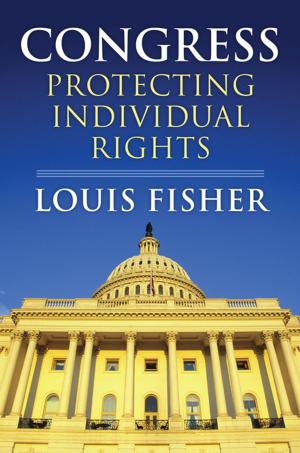Race, Sex, and the Freedom to Marry
Loving v. Virginia
Nonfiction, Reference & Language, Law, Family Law, Civil Rights| Author: | Peter Wallenstein | ISBN: | 9780700620487 |
| Publisher: | University Press of Kansas | Publication: | December 7, 2014 |
| Imprint: | University Press of Kansas | Language: | English |
| Author: | Peter Wallenstein |
| ISBN: | 9780700620487 |
| Publisher: | University Press of Kansas |
| Publication: | December 7, 2014 |
| Imprint: | University Press of Kansas |
| Language: | English |
In 1958 Mildred Jeter and Richard Loving, two young lovers from Caroline County, Virginia, got married. Soon they were hauled out of their bedroom in the middle of the night and taken to jail. Their crime? Loving was white, Jeter was not, and in Virginia—as in twenty-three other states then—interracial marriage was illegal. Their experience reflected that of countless couples across America since colonial times. And in challenging the laws against their marriage, the Lovings closed the book on that very long chapter in the nation's history. Race, Sex, and the Freedom to Marry tells the story of this couple and the case that forever changed the law of race and marriage in America.
The story of the Lovings and the case they took to the Supreme Court involved a community, an extended family, and in particular five main characters—the couple, two young attorneys, and a crusty local judge who twice presided over their case—as well as such key dimensions of political and cultural life as race, gender, religion, law, identity, and family. In Race, Sex, and the Freedom to Marry, Peter Wallenstein brings these characters and their legal travails to life, and situates them within the wider context—even at the center—of American history. Along the way, he untangles the arbitrary distinctions that long sorted out Americans by racial identity—distinctions that changed over time, varied across space, and could extend the reach of criminal law into the most remote community. In light of the related legal arguments and historical development, moreover, Wallenstein compares interracial and same-sex marriage.
A fair amount is known about the saga of the Lovings and the historic court decision that permitted them to be married and remain free. And some of what is known, Wallenstein tells us, is actually true. A detailed, in-depth account of the case, as compelling for its legal and historical insights as for its human drama, this book at long last clarifies the events and the personalities that reconfigured race, marriage, and law in America.
In 1958 Mildred Jeter and Richard Loving, two young lovers from Caroline County, Virginia, got married. Soon they were hauled out of their bedroom in the middle of the night and taken to jail. Their crime? Loving was white, Jeter was not, and in Virginia—as in twenty-three other states then—interracial marriage was illegal. Their experience reflected that of countless couples across America since colonial times. And in challenging the laws against their marriage, the Lovings closed the book on that very long chapter in the nation's history. Race, Sex, and the Freedom to Marry tells the story of this couple and the case that forever changed the law of race and marriage in America.
The story of the Lovings and the case they took to the Supreme Court involved a community, an extended family, and in particular five main characters—the couple, two young attorneys, and a crusty local judge who twice presided over their case—as well as such key dimensions of political and cultural life as race, gender, religion, law, identity, and family. In Race, Sex, and the Freedom to Marry, Peter Wallenstein brings these characters and their legal travails to life, and situates them within the wider context—even at the center—of American history. Along the way, he untangles the arbitrary distinctions that long sorted out Americans by racial identity—distinctions that changed over time, varied across space, and could extend the reach of criminal law into the most remote community. In light of the related legal arguments and historical development, moreover, Wallenstein compares interracial and same-sex marriage.
A fair amount is known about the saga of the Lovings and the historic court decision that permitted them to be married and remain free. And some of what is known, Wallenstein tells us, is actually true. A detailed, in-depth account of the case, as compelling for its legal and historical insights as for its human drama, this book at long last clarifies the events and the personalities that reconfigured race, marriage, and law in America.


